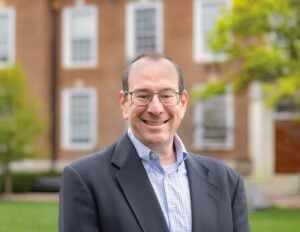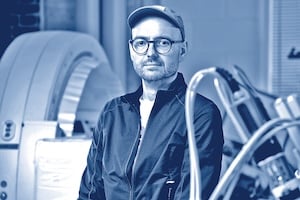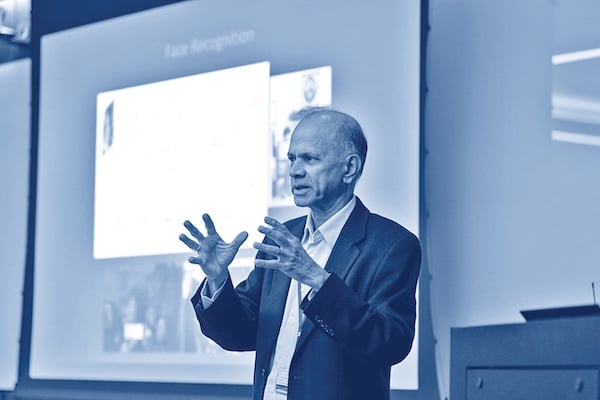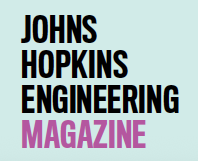Launched in 2023 and based in the Johns Hopkins Whiting School of Engineering, the Data Science and AI Institute (DSAI) unites experts across disciplines—at Johns Hopkins and beyond—to leverage the opportunities and challenges presented by the explosion of data and the rise of accessible AI.
Mark Dredze Named Director of DSAI

Mark Dredze, the John C. Malone Professor of Computer Science, a member of the Johns Hopkins faculty since 2009, and a pioneer in the application of artificial intelligence for language analysis to public health and medicine, has been named the inaugural director of the university’s Data Science and AI Institute.
His appointment follows an international search for an individual to lead an institute that brings together world-class experts in artificial intelligence, data science, machine learning, applied mathematics, computer engineering, and computer science to fuel data-driven discovery and innovation in research activities across the institution.
“Mark’s research accomplishments, ability to identify and act on opportunities that address real and pressing societal problems, and skill at building partnerships make him an ideal leader for this effort,” says Ed Schlesinger, the Whiting School’s Benjamin T. Rome Dean. “He has been integral to DSAI’s success, and his vision and reputation will enable us to attract the most qualified and innovative faculty and students, and maximize our impact on the world.”
Dredze is internationally recognized for his groundbreaking work using machine learning and natural language processing to extract insights from social media data to enhance our understanding of human behavior and inform public health policy and interventions.
This work dates to 2011, when Dredze led a team that released one of the first and most comprehensive studies showing that data from Twitter (now called X) can yield useful and actionable public health information, including forecasting seasonal flu in the U.S. In 2018, his research demonstrated how malicious foreign actors were weaponizing health communications in the U.S. around the vaccine debate.
As one of the founders of this burgeoning area of data informatics research, Dredze’s work has provided critical insights into public health issues, such as suicide prevention, vaccine hesitancy, HIV, tobacco, mental health, gun violence, and other topics. In 2017, he coauthored Social Monitoring for Public Health, one of the first books surveying this then-nascent field.
Recently, he has pioneered applications of large language models, such as ChatGPT, in medicine. His 2023 study demonstrated the power of AI-enabled chatbots in delivering high-quality medical information to patients.
Dredze is also affiliated with the Malone Center for Engineering in Healthcare, the Center for Language and Speech Processing, the Human Language Technology Center of Excellence, and the Applied Physics Laboratory. He holds a joint appointment in the School of Medicine.
Since its founding, the institute has made significant strides, enabling faculty growth, increasing doctoral enrollment, and funding collaborative research that has meaningful societal impact.
Amassing Expertise: Faculty Growth
DSAI’s hiring initiative has already added 37 new tenure-line faculty to WSE’s Departments of Applied Mathematics and Statistics (9), Computer Science (17), and Electrical and Computer Engineering (11), and 180 faculty members from Engineering and other JHU divisions are currently affiliated with the institute. Over the next few years, the planned 80 total new DSAI hires will account for 45% of overall growth in the engineering school’s tenure-line faculty since the institute’s launch.
These new scholars bring diverse perspectives and interests that complement the expertise of existing faculty. Their research spans areas ranging from neural networks, computer vision, large language models, and medical robotics to diagnostics and renewable energy.
“They chose Hopkins for the chance to collaborate with world-renowned experts and tackle urgent, global challenges,” says Benjamin T. Rome Dean Ed Schlesinger.
Another 30 Bloomberg Distinguished Professors with expertise in data science and AI are joining Johns Hopkins as part of the DSAI initiative, with joint appointments in Engineering and other JHU divisions.
80
Total DSAI engineering faculty to be hired
30
Bloomberg Distinguished Professors to be hired in AI cluster
750
New PhD students to matriculate
37
DSAI faculty hired to date
180+
JHU faculty affiliated with DSAI
Fluent, Fast, and Fair
In collaboration with Microsoft Research, computer scientist Philipp Koehn and his team developed a machine translation model that excels in 50 diverse languages.
Supporting Safer, Smarter AI in Surgery

John C. Malone Associate Professor
To advance trustworthy AI systems, DSAI launched its Trusted Dataset Awards in 2024 with two inaugural grants that support groundbreaking projects in health care AI.
Computer scientist Mathias Unberath and his multidisciplinary team used the award to advance ambient intelligence in operating rooms. They created over 50 simulated surgical videos, established secure annotation protocols, and developed AI tools for a reliable dataset that improves AI interpretation of complex surgical environments. Additionally, they built a HIPAAcompliant infrastructure for secure data access.
Swaroop Vedula, an associate research professor in the Malone Center for Engineering in Healthcare, is tackling data silos in surgical AI by creating interoperable, shareable datasets that enable reliable surgeon assessment and feedback. The standardized annotations and metadata models foster scalable collaborations across institutions for responsible AI in surgery.
DSAI is helping to advance research by supporting promising faculty projects. Since the institute’s launch, it has provided approximately $1 million in research awards, including:
3
Junior Faculty Awards
4
Demonstration Projects
4
Trusted Data Set Awards
10
Discovery & Inquiry Seed Grants
Predicting Material Properties
An AI tool by materials scientist Kamal Choudhary analyzes data and models to predict material behavior without testing, potentially accelerating the discovery of advanced batteries and tougher alloys.
Informing AI Policy
As artificial intelligence rapidly reshapes our world, Johns Hopkins is holding events to foster dialogue about its potential and risks. The university’s goal is to better equip policymakers with accurate insights and a deeper understanding of AI—knowledge crucial for shaping thoughtful regulation, ethical innovation, and everyday decision-making in an AI-driven future.
These events this year included a panel of Johns Hopkins AI experts presenting research to members of Congress and staff, highlighting innovations from first responder robots to AI-driven medical diagnostics and AI Boot Camp, where Johns Hopkins experts discuss AI’s role in government, national security, and ethics with congressional staffers.

Rama Chellappa, Bloomberg Distinguished Professor,
electrical and computer and biomedical engineering
Investing in Compute Power
Johns Hopkins is enhancing its high-performance computing infrastructure to drive innovative AI and data science research while supporting future growth.
Building on its solid foundation in research computing and data storage, the university is making significant investments in GPU and CPU capacity, network speed, and storage.
Phase one includes expanding GPU and CPU capabilities, increasing network connectivity speeds across research and enterprise systems, and boosting storage capacity.
These upgrades will facilitate cross-campus collaboration, enable large-scale data sharing, and support the expanding community of faculty and graduate students in AI and data science.
Building a Global Hub for Data Science and Artificial Intelligence Research
While the institute currently occupies space on JHU’s Homewood and Mount Washington campuses, plans are underway for a new home for DSAI at the southern edge of the Homewood campus.
The 476,000 square-foot space spans two connected buildings and will feature laboratories, high-tech classrooms, meeting spaces for collaboration, and offices for faculty and graduate students. “This hub for data science and AI research will impact the entire university and beyond,” says Schlesinger.
2029
Target Opening
476k
Square-foot building
11k
Projected construction-related jobs
Cardiac Modeling
Biomedical engineer Murray B. Sachs Professor Natalia Trayanova’s AI model analyzes underused heart imaging and diverse medical records to uncover hidden insights into heart health and identify patients at risk for sudden


